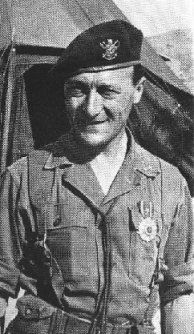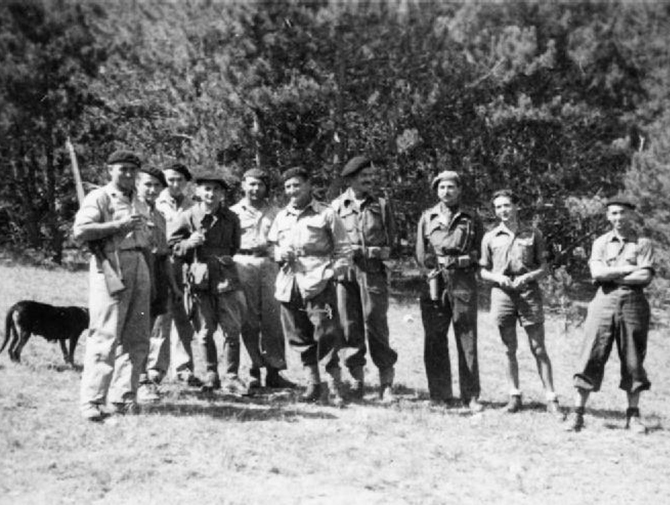Guérisse, Albert Marie Edmond "Patrick O'Leary"
- Date of birth:
- April 5th, 1911 (Brussels, Belgium)
- Date of death:
- March 26th, 1989 (Waterloo, Belgium)
- Nationality:
- Belgian (1830-present, Constitutional Monarchy)
Biography
Albert Guérisse was an army physician when Germany invaded Belgium in 1940. He fled to Gibraltar after the Belgian Army's surrender and joined a British Navy special operations unit and, using the name Patrick O'Leary, participated in secret missions in the Mediterranean.
Do you have more information about this person? Inform us!
- Period:
- Second World War (1939-1945)
- Rank:
- Lieutenant Commander
- Unit:
- F Section, Special Operations Executive (SOE), British Government
- Awarded on:
- 1942
- Period:
- Second World War (1939-1945)
- Rank:
- Lieutenant Commander
- Unit:
- F Section, Special Operations Executive (SOE), British Government
- Awarded on:
- 1946
"Lieut.-Cmdr. O'Leary was captured by the French police during operations off the south coast of France in April, 1941. He escaped while en route to a French prison, and thereupon set up an organization to help the escape of Allied prisoners of war and evaders. Through his skill and his sustained personal bravery, the organization succeeded, between April and August, 1941, in getting away some 150 officers and men, many belonging to the Royal Air Force. At increased risk to himself, Lieut.-Cmdr. O'Leary was soon forced to expand his organization, to help an ever-increasing number of evaders. To keep the members working at full pressure, and to inspire their confidence, he travelled frequently between the Dutch border and the south of France through numerous German controls, himself escorting numbers of escapers. If any question arose of hazard greater than usual, Lieut.-Cmdr. O'Leary carried out the work himself.
In March, 1943, he was betrayed to the Gestapo by a member of his group. Arrested, he was put to many forms of torture in an attempt to make hinm reveal the names, whereabouts and duties of the other members. He was put in a refrigerator for four hours, he was beaten continually, but never did he disclose information which could be of profit to the enemy. After more ferocious experiments the Germans gave him up as hopeless, and sent him to a concentration camp where he was once again the victim of torture. He was a prisoner in Mauthausen, Natzweiler, Neubremm and finally Dachau. He nearly lost his life in the Neubremm quarries, where he was beaten insensible. Throughout his time in prison, Lieut.-Cmdr. O'Leary's courage never faltered. Numbers of prisoners have given evidence that his moral and physical influence and support saved their lives. On his liberation from Dachau, Lieut.-Cmdr. O'Leary refused to leave the camp, where he had been made "President " of all the prisoners (including some thousands of Russians), until he had ensured that all possible steps had been taken to ease the lot of his fellows. He was then given the opportunity to return to his family, but he insisted on proceeding to France, to trace the surviving members of his organization, and to help them in any way he could.
From the time of inception until the end of the war, Lieut.-Cmdr. O'Leary's group was responsible for the rescue and successful return of over 600 British and American officers and men. It is now known that over 250 owe their safety directly to Lieut.-Cmdr. O'Leary, whose fortitude and determination matched every task and risk."
- Period:
- Second World War (1939-1945)
- Rank:
- Kapitein-Geneesheer (Captain Doctor)
- Awarded on:
- December 16th, 1946
Medical officer with unbridled courage frequently having displayed fearlessness, endurance and defiance of death. Following the capitulation of France, he moved to Gibraltar where he was commissioned by the Royal Navy, at his own urging under the name of Patrick O’Leary. In the rank of Lieutenant he took part in a series of operations in the Mediterranean where, unfortunately, he was taken prisoner in April 1941. He managed to escape and established an action group in France which assisted Allied military to escape. In 1942 he was awarded the DSO in recognition of his services. In March 1943, he was apprehended by the Gestapo and subjected to interrogation. Taken to concentration camps, he stayed in Neuengamme, Buchenwald en Dachau where he distinguished himself by his fortitude and his resistance to enemy action. After Dachau was liberated in May 1945, he remained behind to stay with his comrades in distress and continued caring for them until ordered to return to Belgium.
He will be wearing the military decoration with palm and from now on, he will take his place within the Order.
With Palm
- Period:
- Second World War (1939-1945)
- Unit:
- F Section, Special Operations Executive (SOE), British Government
With Palm
- Period:
- Second World War (1939-1945)
- Period:
- Korean War (1950-1953)
- Rank:
- Majoor-Geneesheer (Major Doctor)
- Awarded on:
- 1951
He had offered spontaneously to retrieve an injured man from less that 150 yards from the enemy lines and succeeded in doing so with the help of an American tank and under a hail of bullets.
- Period:
- Second World War (1939-1945)
- Awarded on:
- July 13th, 1947
Sources
- Photo: George Cross Database
- - The British Medical Journal
- Albert Guerisse (Pat O'Leary)
- Belgisch staatsblad, Nummers 152-181
- De Gazet van Aalst, 30 augustus 1951, pagina 3
- 666-4 Bad Request !!!











